|

Summer
1999 (7.2)
Pages
38-39
Gorkhmaz Afandiyev
(1928-1993)
Visit AZgallery.org for more works of Gorkhmaz Afandiyev, his wife Bayim Hajiyeva and his daughter Fovziya Afandi.
Reflections
by his Wife, Bayim Hajiyeva, and Daughter Fovziya
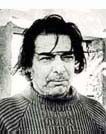  Gorkhmaz Afandiyev's
name is often closely linked with that of his colleague Javad
Mirjavad. As dissident artists, they were known for encouraging
younger artists to follow their own individual paths rather than
adhering to the government-endorsed style of Social Realism. Gorkhmaz Afandiyev's
name is often closely linked with that of his colleague Javad
Mirjavad. As dissident artists, they were known for encouraging
younger artists to follow their own individual paths rather than
adhering to the government-endorsed style of Social Realism.
During a recent interview with Gorkhmaz' wife Bayim Hajiyeva
and daughter Fovziya Afandiyeva, we learned about the personal
tragedy that drove Gorkhmaz to reject the Soviet system and take
such a radical stance.
The men in Gorkhmaz
Afandiyev's family each dedicated their lives to very different
ideals. Gorkhmaz' great-grandfather was a religious man, a Mufti
(chief of the Moslem Sunnite priesthood). Gorkhmaz' father, Sultanmajid
Afandiyev, was one of the top leaders of the Bolshevik Revolution
like Nariman Narimanov and Hamid Sultanzade who helped bring
communism to Azerbaijan and organize a socialist government.
As is well known, the Soviet system did its best to undermine
religious belief and destroy churches and mosques. Fourth-generation
Gorkhmaz, on the other hand, totally disapproved of the Soviet
system that his father had helped establish.
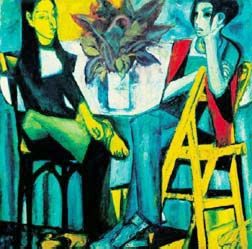 The
tragic year of 1937 left indelible scars on Gorkhmaz' art. His
father, who had taken an active part in establishing the Soviet
system in Azerbaijan, became one of its own victims and was killed
during Stalin's Repression that year. The
tragic year of 1937 left indelible scars on Gorkhmaz' art. His
father, who had taken an active part in establishing the Soviet
system in Azerbaijan, became one of its own victims and was killed
during Stalin's Repression that year.
Right:
Gorkhmaz
Afandiyev, "Adila and Fovziya" (his daughters), 140
x 140 cm, oil on canvas, 1980.
Other members of his family, including his mother, were sent
into exile in Siberia. The three children-Gorkhmaz and his two
sisters-were left without any means of support and spent their
childhood living with relatives. According to his wife Bayim
Hajiyeva, who is also an artist, this was the reason that Gorkhmaz
never used bright colors in his paintings up until his death
in 1993. "That doesn't mean that he was dull by nature.
On the contrary, he was very cheerful and kind. Simply his reminiscences
of childhood and youth had a profound psychological effect on
him," she explains.
Deep in his
heart, Gorkhmaz never forgave his father for his Communist principles.
He refused to join the Communist Party. When he was asked to
draw his father's portrait, he refused, though on occasion he
did draw Lenin's portrait (even though it was against his convictions)
just to earn money.
Friendship with Javad
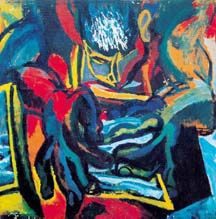  By the time Gorkhmaz
entered the Azim Azimzade Art Institute in Baku in the early
1940s, he was worn out and starving. Javad Mirjavad, a fellow
art student who was five or six years older than Gorkhmaz, took
care of him. By the time Gorkhmaz
entered the Azim Azimzade Art Institute in Baku in the early
1940s, he was worn out and starving. Javad Mirjavad, a fellow
art student who was five or six years older than Gorkhmaz, took
care of him.
Left: Gorkhmaz Afandiyev,
"Searching", 140 x 140 cm, oil on canvas, 1958.
Right: Fovziya Afandi (Gorkhmaz' daughter) (1963- ), "The
Poet Nasimi", 30 x 90 cm, stained glass, 1987.
Javad took Gorkhmaz to his cottage in Buzovna and nursed him
back to health. Gorkhmaz' daughter Fovziya recalled, "It
was a kind of fatherly love and care that my father never forgot.
Despite their disagreements, he always considered Javad to be
his closest friend."
Gorkhmaz and Javad were very influenced by Russian art. They
also studied French art, especially the works of the Impressionists,
rather than the realistic presentation of Social Realism that
the Soviet system strongly endorsed. Gorkhmaz went on to study
in Moscow, then went to Lvov because he found the inclement weather
in Moscow was not good for his health.
In 1956 he returned to Baku. Even though Stalin had already died
[1953], Gorkhmaz still found it difficult to find work in 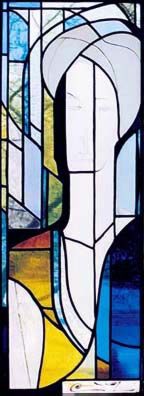 Azerbaijan
because he was descended from an "Enemy of the People".
He had offers to work in Russia, but turned them down because
he wanted to remain in Azerbaijan. Azerbaijan
because he was descended from an "Enemy of the People".
He had offers to work in Russia, but turned them down because
he wanted to remain in Azerbaijan.
Fovziya remembers that her father used to say that art could
not develop and flourish during the Soviet period unless the
official attitude toward art changed. In his opinion, art was
innately symbolic. "When there is no notion about abstraction
in art, it cannot be real art," he used to say. The language
that Gorkhmaz spoke in his art was never understood by Party
members, and his abstract pictures were not accepted for the
exhibitions that were being held at the time. [It wasn't until
May 1999 that the Artists' Union under the direction of Farhad
Khalilov finally organized an exhibition of Gorkhmaz' works to
commemorate his 70th Jubilee].
Fovziya says that her father was among those artists who tried
to break the information blockade created by the Stalinist system.
They desperately wanted to find out what was going on in the
world, especially in the arts. They wanted to know and be known.
This quest invariably resulted in an impasse. This process is
illustrated in one of Gorkhmaz' paintings. "One of my father's
works is called 'Searching'. In it he depicts a man sitting and
looking up something in a book. The scene recalled the time when
he had no library of his own and had to spend a lot of time in
the library."
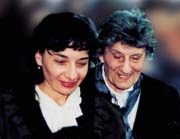  Left: Daughter Fovziya Afandi and wife Bayim
Hajiyeva at Gorkhmaz' exhibition for his 70th Jubilee, May 1999.
Baku. Left: Daughter Fovziya Afandi and wife Bayim
Hajiyeva at Gorkhmaz' exhibition for his 70th Jubilee, May 1999.
Baku.
Right: Stain glass of the
poet Nasimi by Fovziya Afandi, daughter of Gorkhmaz Afandiyev.
Gorkhmaz
and Javad laid an alternate path for many young talented artists
to enter the art world. He was keen that his two daughters pursue
art as well. As it turns out, they did. Adila works as an artist
in Vilnius. Fovziya, who went on to study art in Lvov, now works
as an artist in Baku.
From
Azerbaijan
International
(7.2) Summer1999.
© Azerbaijan International 1999. All rights reserved.
Back to Index
AI 7.2 (Summer 99)
AI Home
| Magazine
Choice | Topics
| Store
| Contact
us
|


 The
tragic year of 1937 left indelible scars on Gorkhmaz' art. His
father, who had taken an active part in establishing the Soviet
system in Azerbaijan, became one of its own victims and was killed
during Stalin's Repression that year.
The
tragic year of 1937 left indelible scars on Gorkhmaz' art. His
father, who had taken an active part in establishing the Soviet
system in Azerbaijan, became one of its own victims and was killed
during Stalin's Repression that year.
 Azerbaijan
because he was descended from an "Enemy of the People".
He had offers to work in Russia, but turned them down because
he wanted to remain in Azerbaijan.
Azerbaijan
because he was descended from an "Enemy of the People".
He had offers to work in Russia, but turned them down because
he wanted to remain in Azerbaijan.